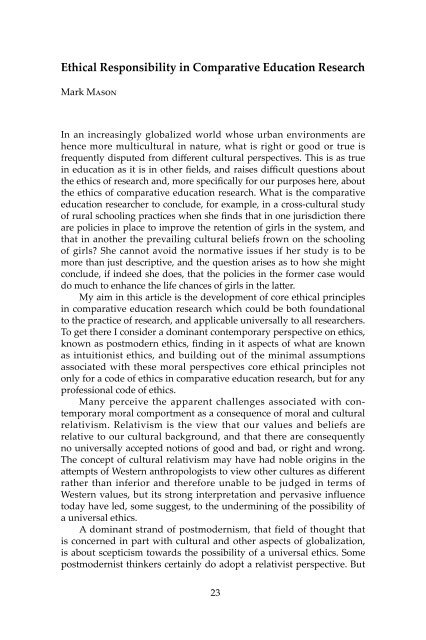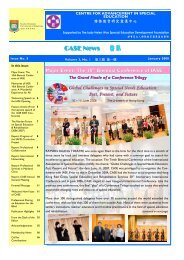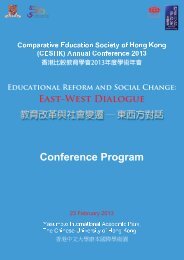Comparative Education Bulletin - Faculty of Education - The ...
Comparative Education Bulletin - Faculty of Education - The ...
Comparative Education Bulletin - Faculty of Education - The ...
You also want an ePaper? Increase the reach of your titles
YUMPU automatically turns print PDFs into web optimized ePapers that Google loves.
Ethical Responsibility in <strong>Comparative</strong> <strong>Education</strong> Research<br />
Mark Mason<br />
In an increasingly globalized world whose urban environments are<br />
hence more multicultural in nature, what is right or good or true is<br />
frequently disputed from different cultural perspectives. This is as true<br />
in education as it is in other fields, and raises difficult questions about<br />
the ethics <strong>of</strong> research and, more specifically for our purposes here, about<br />
the ethics <strong>of</strong> comparative education research. What is the comparative<br />
education researcher to conclude, for example, in a cross-cultural study<br />
<strong>of</strong> rural schooling practices when she finds that in one jurisdiction there<br />
are policies in place to improve the retention <strong>of</strong> girls in the system, and<br />
that in another the prevailing cultural beliefs frown on the schooling<br />
<strong>of</strong> girls? She cannot avoid the normative issues if her study is to be<br />
more than just descriptive, and the question arises as to how she might<br />
conclude, if indeed she does, that the policies in the former case would<br />
do much to enhance the life chances <strong>of</strong> girls in the latter.<br />
My aim in this article is the development <strong>of</strong> core ethical principles<br />
in comparative education research which could be both foundational<br />
to the practice <strong>of</strong> research, and applicable universally to all researchers.<br />
To get there I consider a dominant contemporary perspective on ethics,<br />
known as postmodern ethics, finding in it aspects <strong>of</strong> what are known<br />
as intuitionist ethics, and building out <strong>of</strong> the minimal assumptions<br />
associated with these moral perspectives core ethical principles not<br />
only for a code <strong>of</strong> ethics in comparative education research, but for any<br />
pr<strong>of</strong>essional code <strong>of</strong> ethics.<br />
Many perceive the apparent challenges associated with contemporary<br />
moral comportment as a consequence <strong>of</strong> moral and cultural<br />
relativism. Relativism is the view that our values and beliefs are<br />
relative to our cultural background, and that there are consequently<br />
no universally accepted notions <strong>of</strong> good and bad, or right and wrong.<br />
<strong>The</strong> concept <strong>of</strong> cultural relativism may have had noble origins in the<br />
attempts <strong>of</strong> Western anthropologists to view other cultures as different<br />
rather than inferior and therefore unable to be judged in terms <strong>of</strong><br />
Western values, but its strong interpretation and pervasive influence<br />
today have led, some suggest, to the undermining <strong>of</strong> the possibility <strong>of</strong><br />
a universal ethics.<br />
A dominant strand <strong>of</strong> postmodernism, that field <strong>of</strong> thought that<br />
is concerned in part with cultural and other aspects <strong>of</strong> globalization,<br />
is about scepticism towards the possibility <strong>of</strong> a universal ethics. Some<br />
postmodernist thinkers certainly do adopt a relativist perspective. But<br />
23
















